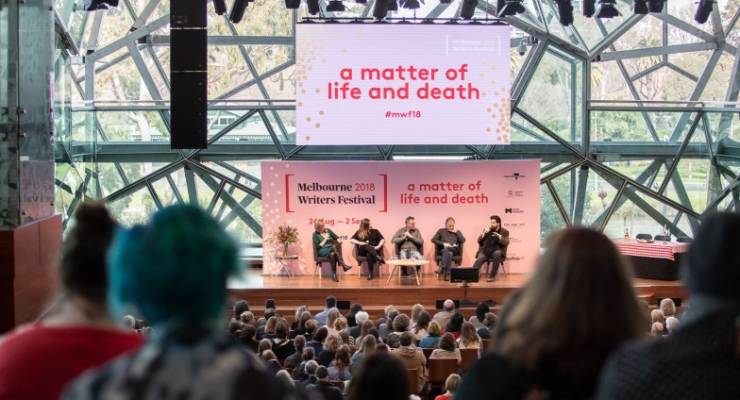
Yesterday, we asked you to share your thoughts on the (ever evolving) role of writers festivals in a world where fewer people seem to be reading; a question raised by, among others, Guy Rundle. Among the comments that Crikey received was some useful insight from the director of Adelaide Writers’ Week and former Sydney Writers’ Festival CEO Jo Dyer. Elsewhere, the furor surrounding former soldier Ben Roberts-Smith’s battle with Fairfax continued, and produced some choice comments along the way.
On the point of writers festivals
Jo Dyer, director of Adelaide Writers’ Week, writes: The point of writers’ festivals is two-fold. They are platforms for the discussion of ideas, and a celebration of writing and its exploration of our shared humanity. Traditionally, the writing celebrated has been literature, with a sideline in poetry. More recently, the focus has widened to include writing for performance such as slam poetry, song lyrics and podcasts.
Festivals have invested significant effort to diversify the homogeneity of both their line-up and audiences. The cliché of white middle class writers talking to white middle class audiences is increasingly inaccurate. In Melbourne, Marieke Hardy’s program is as diverse as Australia. At Sydney Writers’ Festival, Michaela McGuire is building on Jemma Birrell’s strong legacy in an exciting and lateral way. Some commentators express surprise — even displeasure — that voices long ignored use their new festival platform to discuss their prior exclusion from it, and from corridors and positions of power. Playing the victim is the new orthodoxy, they sniff.
Discussing issues of identity, privilege and power from a variety of perspectives — including and especially from those impacted negatively by society’s resilient hierarchies — is vital. To characterise acknowledgment of the damage caused by exclusion as a narcissistic salve for a wounded self is specious. The pernicious effects of inequality and the impact of an increasingly virulent backlash from those threatened by the assertion of a broader worldview are critical discussions to have in our fractured world, discussions that should feature a rich diversity of voices. Heaven forfend if some voices speak consciously and loudly in celebration of an otherness for which they are often denigrated.
Festivals across all artforms bring people together in real time and real space for a shared experience. Writers’ festivals particularly deliver informed and imaginative minds from the worlds of fiction, research and reportage and curate them into challenging events and expert discussions — sometimes weighty, sometimes playful. Passionate and growing audiences suggest this remains a meaningful endeavour.
Ruv Draba writes: As Guy rightly pointed out, the moveable-type printing press enabled the mass production of vast codices of linear text. Yet hyperlinks have been around conceptually since 1965, and practically since 1987. So it seems to me we’ve been post-Gutenberg to some extent for 30-50 years. And the oral broadcast model has been around since forever. All of which make me wonder which of the properties of the Gutenbergian format are endemically sacred, and which are endemic but profane, or not endemic in the first place.
Is it portability? Not in modern times, since you can have audio, video or the whole of Wikipedia come with you. Is it mass access? Definitely not. Is it focus? Organisation? Style? I’m not convinced: there’s nothing of these in written fiction that you can’t also find in an audiobook only more so.
If anything remains sacred about written fiction, I think it’s an incidental social effect: the right to focus on another distant person’s ideas to the exclusion of all else; to tell others to bugger off, I’m reading. A right that’s compromised whenever you’re seen with ear-buds or a smart-phone, yet still oddly respected when your hands are prayerfully loaded with dead tree and glue.
That’s probably worth a festival; I’m just not sure what we’d do in it, other than leave each other the hell alone.
On Ben Roberts-Smith v Fairfax
Wallywonga writes: I enjoy quality journalism, but have always been less comfortable with the “expose” variety, no matter how well written or whom the subject. The often protracted and usually unsatisfying legal consequences to all parties make it cynic’s delight. The Hockey case is the penultimate example of high legal farce, where it was found that what was written was substantially true, but he was defamed by a headline (and not a very dramatic one at that!)
Lets just say that it was very surprising when Roberts-Smith started branding himself as tall handsome war hero (complete with shirtless photo ops); maybe its a generational thing, but believe a lot of us prefer the words “modest, unassuming” to accompany the word hero.
He invited snipes, now has them big time, no matter what the legal outcome.
Send your comments, corrections, clarifications and cock-ups to boss@crikey.com.au. We reserve the right to edit comments for length and clarity. Please include your full name.







Onya, Crickey! Congratulations on sticking with the tried-&-true ‘Comments, corrections, clarifications & cock-ups’.
This is no place for a ‘conversation’.